Peter Fenzel: It’s a bit of a shame that the new Jennifer Lawrence / Chris Pratt movie Passengers got so slammed by critics. It’s not that I disagree with the consensus take on it, but I didn’t see as much engagement with what the movie was saying prior to the collapse at the end as I might have liked.
The end is a huge mess that undermines the rest of what has happened to that point, but through the first and second acts, it’s a pretty interesting movie with some provocative and intense ideas. It balances dark and terrible notions with a sense of fun and an identifiable, resonant humanity.
In the end, the fun ends up inappropriately downplaying how terrible the ideas, but earlier on, it was a spoon full of sugar that made the medicine watchable.
My dear friend Mr. Belinkie, I know you haven’t seen it, but let’s have a spoilery conversation about it. I’ll run down how I saw the movie through the first two acts. And then maybe talk about how it fell apart at the end and the cost of that.
There should be a special sort of spoiler alert for movies this frowned-upon: As in, “if after this discussion, the movie is ruined, we’re not the ones who ruined it.” Consider that warning issued.

The basic premise from the commercials is that this is a romantic but scary movie about falling in love with a stranger. Chris Pratt and Jennifer Lawrence are colonists on a slower-than-light-speed spaceship heading for a new world. The trip takes over a hundred and twenty years, and so everybody on the ship is put in suspended animation. However, something goes wrong about 30 years in, and Chris and Jen wake up 90 years early. The ship is a sort of automated hotel/resort, so all their needs are provided for, but they face the bleak reality of only having one other person there for the rest of their lives. Against that backdrop, they find love, and each other, and together, they survive.
This is, of course, not what the movie is about. The commercials remain pretty misleading in this regard.
For the first two acts, we instead get an existential rumination on freedom and loneliness in the spirit of Soren Kierkegaard, along with a feminist horror story about consent, emotional abuse and rape culture, with a creation-myth vibe about a future society built on a terrible original sin thrown in for good measure.
A lot of it is about the limits of forgiveness and acting decently and compassionately in extreme situations. Or at least it would be if the ending didn’t entirely sell it out.
Here’s the gist of the movie as I saw it: Chris Pratt is on this colony-bound spaceship, and he’s the only one who wakes up. He has the Home Alone Hero’s Journey: first he’s confused, then he’s happy, and he plays video games and eats sushi every night and drinks whiskey with a robot bartender.
He’s racking up a debt on his charge account he will have to pay later, but it’ll be decades before Earth gets his distress call, decades before any answer reaches him, and he’ll be long dead before anyone else wakes up, so, screw it, right?
But this only lasts so long. He’s alone on the ship (robot bartender notwithstanding) for over a year, and he descends into madness. He walks around naked for months. He grows a huge mountain man beard. He takes spacewalks in a space suit and just stands on the hull of the ship and stares out into the void. At one point he attempts suicide by almost shoving himself out an airlock.
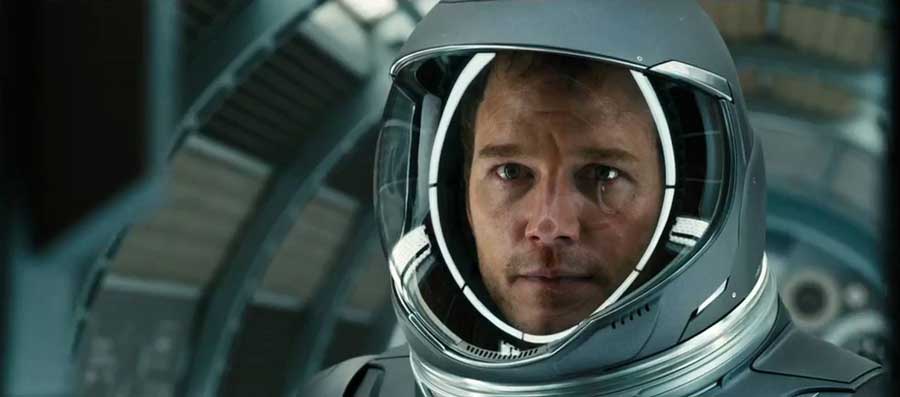
All the while, he reads up on the other passengers. There’s 5,000 of them, and it’s implied he gets to know who most of them are, through text and video records. The movie ends up narrowing this down to a peculiar interest in Jennifer Lawrence in a way that kind of sells his craziness short (presumably to strengthen this notion that he is in love and they are meant to be), but later in the movie he’s able to quote the occupation of random passengers without looking at their readouts.
In short, he busies himself with reading about the other passengers, and eventually he becomes obsessed with Jennifer Lawrence’s character, Aurora. He convinces himself that if they met they would be in love and he would build her a house (it’s a theme throughout the story that automation robs humanity of an essential existential need and comfort by making it so people can’t build and create things themselves).
He decides he wants to wake her up too, but make it look like an accident, and then she will realize when she meets him that they were meant to be together.
This is, of course, all kinds of fucked up. It is the aforementioned abuse: a total disregard for the agency of women, for her life, for consent. Once you wake up you need to go to a special hospital to go back to sleep, and that’s not an option so he’s basically kidnapping her for life to use her sexually.
And, at first, it totally works. Aurora buys the deception, and since Chris Pratt’s character Jim is attractive and charming and the only person there, Aurora eventually falls for him and they fall in love. They have a sexual relationship for a while – at least a few months if not the better part of a year – before the robot bartender “spoils” things by telling her the truth.
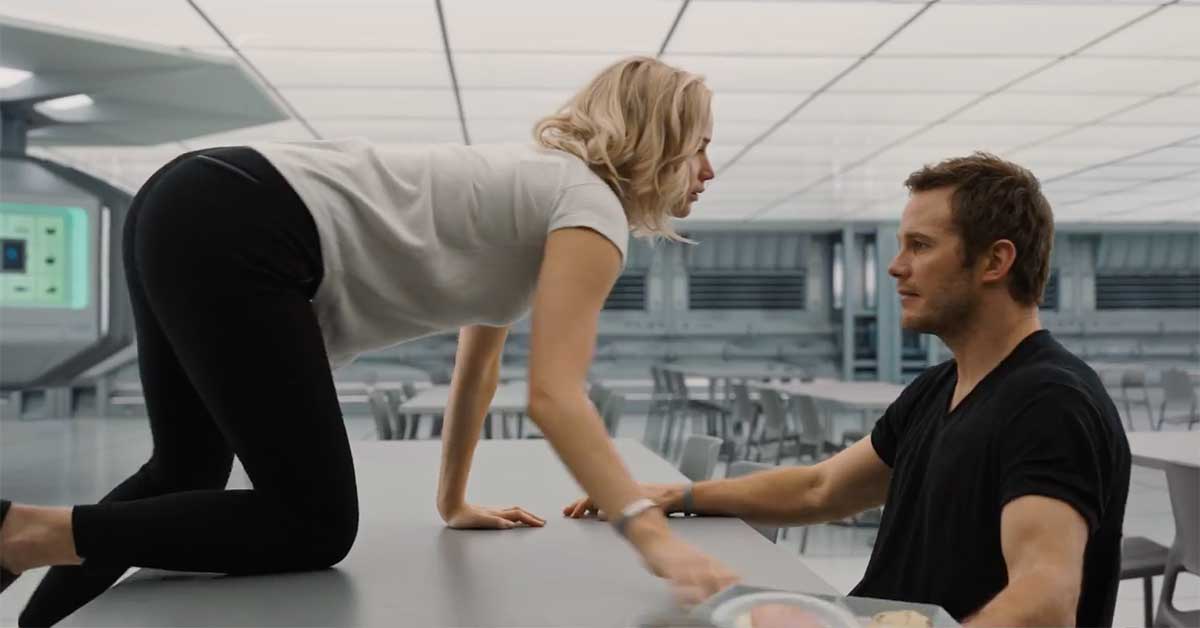
And to the movie’s credit, what he has done is treated with appropriate horror. Aurora immediately and categorically rejects him, screams at him, won’t go near him. He tries to “woo” her over the PA system during her morning jogs, but in one of the better sequences in the movie, what’s a cute gesture from him is to her psychological torture – she shrieks and screams at him and hurls appropriate accusations at him of what he has taken from her.
It’s a great illustration of the kinds of discursive double standards that women have to deal with all the time from men who see them as objects of possession, and how wrong and disgusting that kind of behavior is.
It feels a lot like Genesis to me, except it’s Adam who commits the original sin. At first they are together in Eden, but then the truth outs and they are cast out. Even to the point that there is one big, beautiful analog for the Tree of Life that Jim can’t eat or drink from – the Pumpkin Spice Extreme Latte machine, which he can’t access, because he’s not a gold level passenger. When Aurora shows up, she has the gold level access, and they eat of it together, even though he knows he has done something terribly wrong.
So you go from the Kierkegaard scene where Chris Pratt is staring off into the cosmos contemplating his terrible moral freedom, through a world he creates, to the collapse of that world, because you can’t create other people’s lives for them. It’s wrong and terrible.
That’s part of what the title “Passengers” means, by my estimation; it’s a symbol for the existential human condition, where you can’t control your existence, because the universe and your circumstances predate you, but within your ship you can do what you want, except your choices have shared consequences with other people you are traveling with.
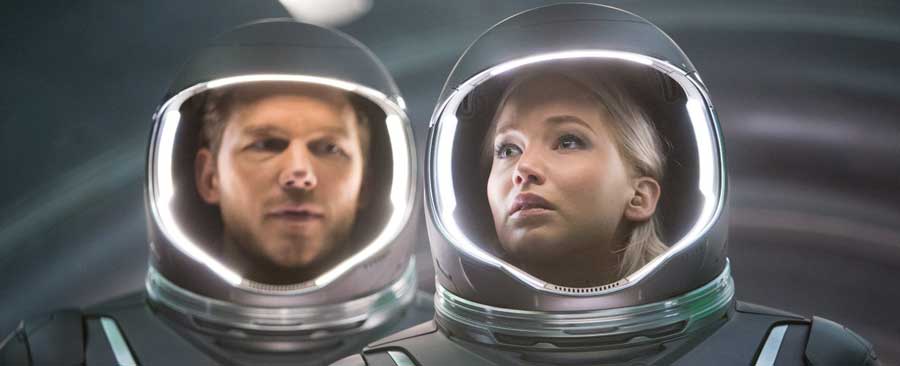
Matthew Belinkie: Passengers has not been particularly well-received (32% on Rotten Tomatoes, which puts it behind meh-looking comedies like Office Christmas Party and Why Him?). It seems like the criticism falls into two categories. Firstly, there’s the movie’s gender politics. Chris Pratt is basically a lonely Nice Guy who really feels like he’d be a super great boyfriend for this hot, inaccessible woman. So he messes up her life and lies to her so he can have her… for her own good, he tells himself. You say that the movie does make it clear how messed up this situation is, but it seems like the filmmakers really can’t really condemn him, because they aren’t trying to tell a story about a terrible man and the woman who he manipulates. They want this to be a cute date movie, which means Chris Pratt needs to be likable. So they make him seem like a fun guy, they show how desperately lonely he is, they show how badly he feels about waking her up, and they give him lots of chances to prove his affection and save her life. (I think it’s important that he’s handsome enough and charismatic enough so that we believe she’d go for him, because who wouldn’t? Passengers would be much more interesting if Christ Pratt were still an overweight kind of schlubby guy like he was during his Parks and Rec phase, instead of a dreamboat.) By the end of the movie she’s willing to forgive him, and so should we (says the movie). It seems like a lot of people have a problem with this.
Then there’s criticism of the movie’s quality overall. I’ll leave it to you to say how fair this is, but it does seem to me that this story is a little slight for a two hour feature. It’s only got the two real characters, there’s no antagonist, there isn’t a big mystery to reveal. It seems like a perfect hourlong episode of The Twilight Zone, and they forced a script doctor to add a zero-G swimming scene so they could sell this as a special effects driven action movie instead of an intimate character-driven drama. So Pete, what were your issues with the movie, creepy gender stuff aside? I’ve heard a couple structural things that seem problematic. In the third act there’s apparently a huge problem with the ship, but Chris Pratt just happens to be one of the few people with the technical skills to fix it. Also, if the problem is really mission endangering, shouldn’t he wake up someone above his pay grade and tell them the ship is about to explode or something? They’re not REALLY on their own – they could potentially wake up the whole crew if they wanted to, right? Also, apparently Lawrence Fishburne is another passenger who also randomly comes out of hibernation, and then quickly dies? What the hell is that about?
Fenzel: Ah! So with these questions in mind, which are good questions, as somebody who has seen the movie, let me answer them!
This is a Sony picture, and Sony at this point deserves a reputation for bloating small movies up into hundred million dollar monsters in the hope they become international blockbusters, while at the same time fouling their stories up in production to the point where they make no sense. Their big recent movies as of this writing, other than the unnecessarily controversial Ghostbusters reboot, include a new Underworld movie, yet another Resident Evil movie, and a big-budget relaunch of Tom Hanks as his Da Vinci Code character. This is the studio that made Pixels and lost Spider-Man. We know from their recent extensive e-mail leaks that all is not well, and something feels fundamentally off about the way they are currently positioning and overseeing their movies.
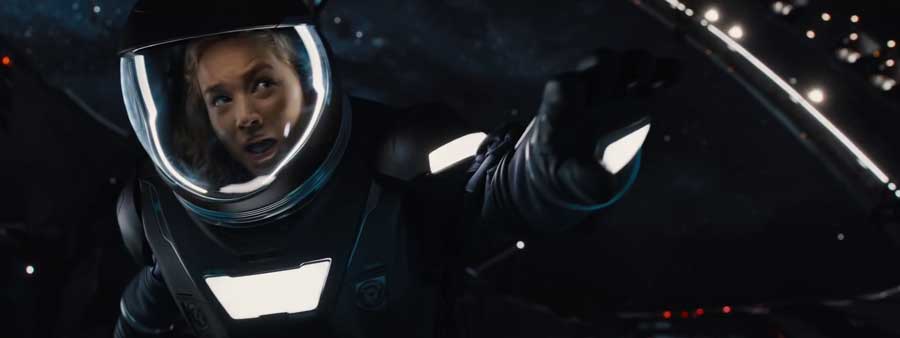
It is pretty clear that Sony wanted Passengers to be a date movie where Chris Pratt and Jennifer Lawrence get together because they like each other. That is not the movie that is on the screen, and that is not the performance the actors give, and the third act’s big problem is it is chopped up and reconstituted to make it look like that’s what was happening all along.
So, to push through this next critical part of the movie summary: Aurora knows Jim has kidnapped her from her desired life, she sees him as a murderer and torturer. One thing I didn’t quite get to is the scene where she goes to his room while he is asleep, punches him in the face a bunch of times, and then attempts to murder him with a shovel. (It may have been a crowbar or other piece of space equipment.)
There is not a scene anywhere in the rest of the movie that I recall where Jennifer Lawrence says that she wants to get back together with Chris Pratt.
However, Sony seems to have hated the movie they have paid for so much that they butchered the ending like that Dr. Moreau episode of South Park where Kyle’s dad turns into a dolphin abomination.
So they cut together sequences that are about other things, perhaps reorder scenes originally shot to appear earlier in the movie, and leave in remnants of some past, completely different third act, that make no sense in context to imply that the two of them get back together because they like each other. But I don’t buy it as an interpretation of the bulk of the movie.
One point that the movie makes and that I think ought to be honored rather than dismissed is that attractive, charming people who consider themselves well-meaning and decent are capable of doing terrible things.
Women do in fact meet charming, good-looking dudes who think of themselves as essentially decent who rape them or otherwise physically or psychologically abuse them. It is not a shortcoming of this movie that the abuser / sexual kidnapper is a man who doesn’t seem like he’d be capable of doing this, and who may not have done it under different circumstances, but people are capable of more than they think they are.
That is a main idea behind the work of Kierkegaard, whose book The Concept of Anxiety is visually referenced throughout the movie.
Belinkie: How is it visually referenced? That seems like a deep cut.
Fenzel: It’s a deep cut, but the symbol has made its way into the general culture, so people reference it in general, not specifically. Kierkegaard is where the concept of a “leap of faith” as popularly understood comes from.
In The Concept of Anxiety Kierkegaard speaks about standing on the edge of a cliff and experiencing anxiety, not just because of the risk of falling off, but because of the freedom to throw yourself off. Standing on the precipice, humans realize just how much freedom they have in the universe, which is terrifying.
Chris Pratt goes through this during the first act of the movie before he wakes up Aurora, where spacewalks out onto the edge of the spaceship and then throws himself off of it (there is an auto-tether that attaches to his suit and reels him in).
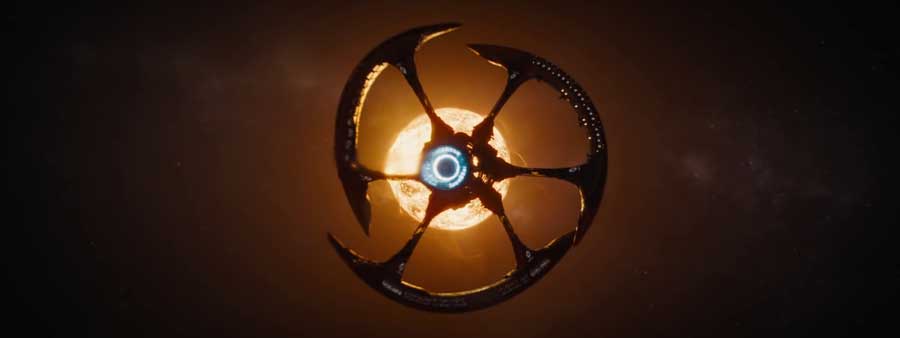
Kierkegaard goes on then to discuss how this anxiety is related to original sin with regards to Adam and Eve: Adam did not know that eating the fruit of the tree of good and evil was wrong, he only knew that God said not to do it. In confronting the fruit, Adam experienced deep dread, because he knew that he had the freedom to eat the fruit, even if God had said it was forbidden. In order to have freedom at all, people have freedom to do terrible things, and that’s all presupposed by anxiety.
This is very similar to Jim’s moral arc in Passengers: first, he realizes that his freedoms are not the same as the things people say he can do. Then, he confronts anxiety and takes a symbolic leap showing his moral freedom. After that, while he knows waking up Aurora is wrong, and he dreads doing it (he even has a scene where he looks in the mirror and begs himself not to do it), he does it anyway.
Can a popcorn special effects movie really have this much contemplative philosophical depth of reference? Well, Gravity was less than four years ago and made more than $700 million at the global box office, despite being symbolic out the wazoo (Remember how Alfonso Cuaron later confirmed that Sandra Bullock’s crawling out of the mud scene was indeed a symbolic illustration of the evolution of human life, as I posited on the podcast? That was a proud moment for us.).
Passengers blows a ton of money on zero-gravity special effects, and it even has multiple scenes involving tethers in zero gravity, so there are times when Passengers thinks it is Gravity. It is not Gravity, of course (it lacks the requisite Gravitas), but I think the green light to get philosophical comes at least partly from that association.
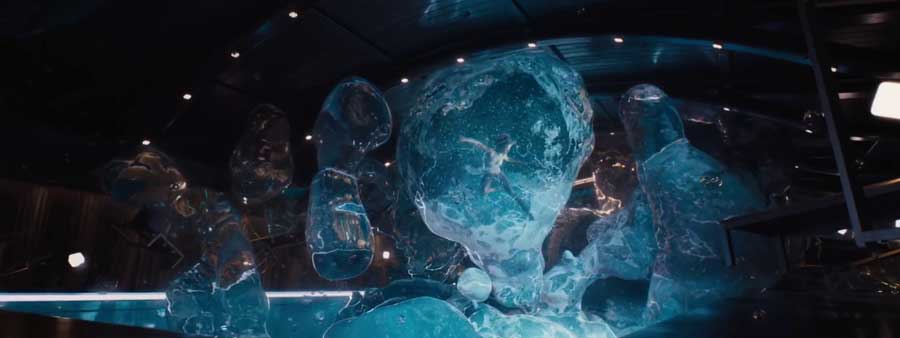
By the way, as if Sony doesn’t have enough problems, Passengers ran into a big legal problem with its CGI and motion capture effects that affected a bunch of different movies in production, and we’ll never truly know its full impact. If the live-action Beauty and the Beast ends up looking terrible or like it is missing key scenes they would have wanted to incorporate, it might be because of this ongoing legal drama surrounding DD3/Digital Domain and the rights to the MOVA motion capture technology.
This would put Passengers in the vaunted company of Star Trek V: The Final Frontier among movies that took nosedives in quality after their special effects firms bailed on them, but for which the quality nosedives cannot be specifically attributed.
Anyway, back to the Passengers that everyone says there is, the Passengers that is, and the Passengers that there could have been.
So, in parallel to the Jim and Aurora plot, the audience knows that the ship is having progressively worse technical problems. Jim and Aurora largely disregard them, more worried about their romantic hostage situation, but Lawrence Fishburne does in fact show up to awaken them to this reality.
As you mentioned, the whole movie would make no sense if there were a way to awaken the crew. But the crew is sealed behind an impenetrable blast door (Jim and Aurora each spend a fair amount of time trying to bring it down with everything from sledgehammers to plasma torches, to no avail).
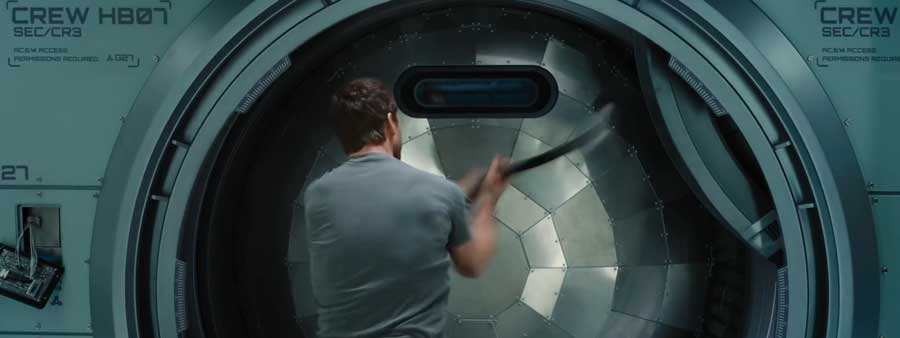
Lawrence Fishburne is one of the lesser crew, and he wakes up and comes out when his pod fails – except it has failed so badly that he has only a day or so left to live before all his organs shut down. At this point, they could wake the crew, but the failures have become so urgent that there isn’t time (this does not explain why they don’t wake them later).
So Morpheus discovers the brutal facts of the situation and relays them to Jim and Aurora – the ship has an elaborate and advanced self-diagnosis and repair protocol, to the point where everything in the ship can be re-purposed to help anything else in the ship. If the ship suffers a truly catastrophic failure, the other systems will step up and keep the place running for a time, but they will eventually also shut down in a progressive “cascade failure.”
The audience has seen the big initial problem at the beginning of the movie – the ship moved through a field of asteroids and took a bunch of serious hits that caused the ship to route all power to its forward shields, which in turn triggered a major power surge and allowed several small rocks to get through and rip holes in various key systems, including the control computer for the ship’s main reactor.
The ship has managed to compensate for this for nigh on two years, but it is reaching accelerating cascade failure (thus the gravity failures and zero-G sequences, including one in which Jennifer Lawrence in a swimsuit is encased in a snow-globe-like ball of floating water, unable to move while being put on display, and nearly drowns). Soon everyone will die.
And this I think introduces some legitimately interesting dramatic situations.
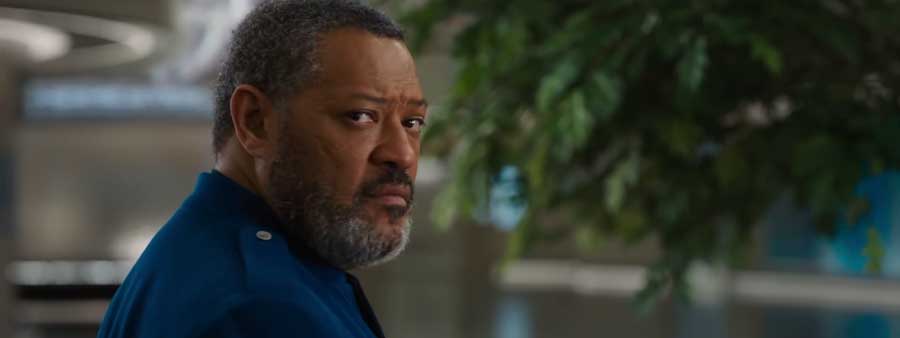
For one, we want to see if Tre’s dad from Boyz ‘N the Hood finds out what Jim did (Jim immediately confesses when the professor from Higher Learning finds signs of foul play in Aurora’s pod). That’s a charged scene.
Aurora wants to see Jim punished for what he did to her. She doesn’t have it in her to revenge-kill him herself, but she appeals to the street-smart chess teacher from Searching for Bobby Fischer under his authority as a crew chief to arrest him for murder and presumably imprison him on the ship.
In a scene that is deceptively rich for interpretation and that shows how great Lawrence Fishburne is as an actor (and I’ll just call the character “Chief Fishburne” from here), he refuses, using the metaphor of a drowning man who pulls down other people as he drowns to at least explain, though not justify, Jim’s act.
- Partly, it seems that Chief Fishburne knows that with the ship on the edge of exploding, they don’t really have time to deal with this situation.
- Partly, Jim is one of only three people on the ship and a mechanic, and is going to be essential to fixing it if fixing it is possible, so Fishburne is going to need to tell Aurora something as an excuse to not arrest him.
- Partly, this fits into the meta-narrative throughout that Aurora is experiencing the reality of women who deal with objectification, manipulation, abuse, and sexual assault that is seen by men as harmless and not taken seriously as a problem. As in – if it were as simple as reporting it to the police, then it wouldn’t still be so big a problem.
- Partly, Chief Fishburne sees the whole situation as terrible and kind of recoils from it – although he does so gracefully. And also he is dying of a huge number of simultaneous organ failures and has his own problems.
Here, I think, we can touch again on the symbolism of the title, Passengers. A person who is “drowning” is generally not on a boat. Thus when Jim was alone, having his existential crisis and attempting suicide, he was not a “passenger.”
But now he is a “passenger,” which means he gets “passage.” Meanwhile, they’re stuck together until the journey is over, as horrible as that is.
Contrary to the claims that the “repair the ship” plot is arbitrary, I do like quite a bit that the condition of the ship is so symbolic of their relationship: they have one big thing that is so wrong that everything else can attempt to compensate for it, but it won’t be enough, and instead it will all fail in a cascade.
Chief Fishburne gives Aurora and Jim his crew authorization to access more of the ship’s systems before dying in a rather silly, abrupt sort of way. This gives them enough capability within the ship to identify the core problem and devise a plan to solve it.
Up until this point, I think we’re still dealing with a “pretty good movie.”
Lawrence Fishburne’s performance seemed odd and was very short, but few people could have walked onscreen at that moment and pulled it off like he did, and it’s good to see him. Also as we’ve established while the movie deals with extreme dread, sadness, and crime against our fellow humans, it is also a funny light-hearted movie with a robot bartender and a Pumpkin Spice Extreme Latte machine (which I should clarify is a general breakfast machine, but the scene where Chris Pratt discovers he can’t order any of the fancy coffee drinks is one of the best moments in the movie, so I felt the need to enshrine it).
And yet, the reactor needs to vent into space and the hatch to vent it is jammed and needs to be opened from the outside of the ship. For Trekkies in the room, this is a very familiar sort of scenario, explored in Star Trek II, Star Trek Into Darkness, and the Bridge Officer Test in Season 7 of Star Trek: The Next Generation.
Vague spoilers for things you’ve already seen: whoever goes to open up that hatch is going to die.
Rightly, Jim volunteers to suit up and hatch-hunt. He has to know he is going to die doing it: he has to climb into a tube that will envelop him in a raging flood of superheated plasma and open the door that breaks the dam all over his face.
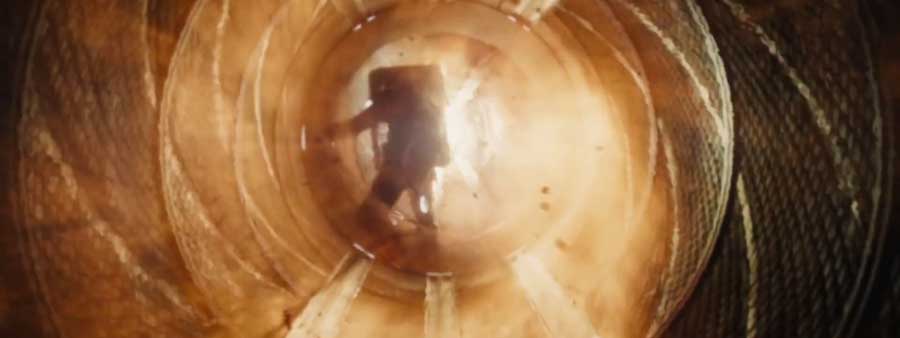
And while this feels cliche and not particularly worthy of a hundred million dollar movie (it’s in Star Trek Into Darkness, but that’s not high praise), it’s still a reasonable way for this movie to go.
So, Jim goes into the tube, he opens the hatch, Jennifer Lawrence pulls a handle that I’m sure is symbolic in some way but I’m not up to date on my handle symbolism, and everybody is going to be okay.
Except, wait! There’s still a chance to save Jim!
He doesn’t quite die but merely almost dies.
So Jennifer Lawrence runs as fast as she can to the space suits, gets on a space suit, and says something to the effect of “I can’t live without you!” and jumps to go save Jim.
Now, you could take this to mean that Aurora really loves Jim and that venting the plasma has vented the problems in their relationship and they’re ready to get back together.
But Aurora has given no indication that she wants a sexual relationship with Jim at any point recently in the movie.
You could also take it to mean that Aurora realizes that, with Chief Fishburne pushing up Ehrmentrauts by the space-river, if Jim dies, she will be the last person awake on the spaceship, and will thus be totally alone. While she truly hates Jim and wants to see him punished for what he did to her, she can’t tolerate the idea of being that isolated, as it would likely also bring her to madness, suicide, or worse.
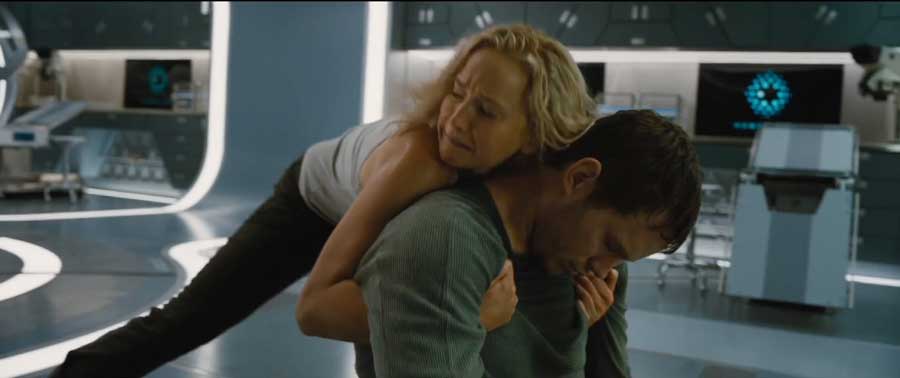
Aurora deciding to take that leap to save Jim is a mirror of Jim taking the leap earlier on: Aurora realizes that while the “rule,” the “law,” is for Jim to be punished for basically kidnapping and abusing her, she free to do whatever she wants to do and must face this anxiety without the comfort and certainty of a necessary, essential, or natural justice.
So, you can choose to see Aurora as a Hollywood damsel rewarding her abuser in truly abhorrent fashion,
Or you can see her as an existential figure in a truly horrible situation deciding to show compassion and mercy to her worst enemy in a way that he never showed to her.
And this choice…
This moment…
Where we don’t know which it is…
Right when Aurora takes the leap…
…Is the last part of the movie that is any good.
Oh, there’s a little treading water. Jim gets taken to the robot doctor and dies on the table. This would be a fine way to end the movie. Jim dies, Aurora is alone, and we cut to Aurora’s room full of pages of a book she’s writing that nobody will read until after she’s dead, then out to the hull of the ship with Aurora staring out into space, contemplating the leap into the void.
Or we see Aurora look at somebody in a suspended animation pod with a look of dread over her face, and we don’t know if she will wake that person up. And it just cuts to credits.
Passengers: a pitch dark, really really bleak movie, but alright.
At this point, the movie is still okay.
But then of course Aurora uses Chief Fishburne’s crew clearance to get the robots to take extreme measures to resuscitate Jim, and of course he wakes up.
And this is where it gets weird/bad.
In Part 2, we’ll talk about the movie’s bizarre ending and how it might have been improved.
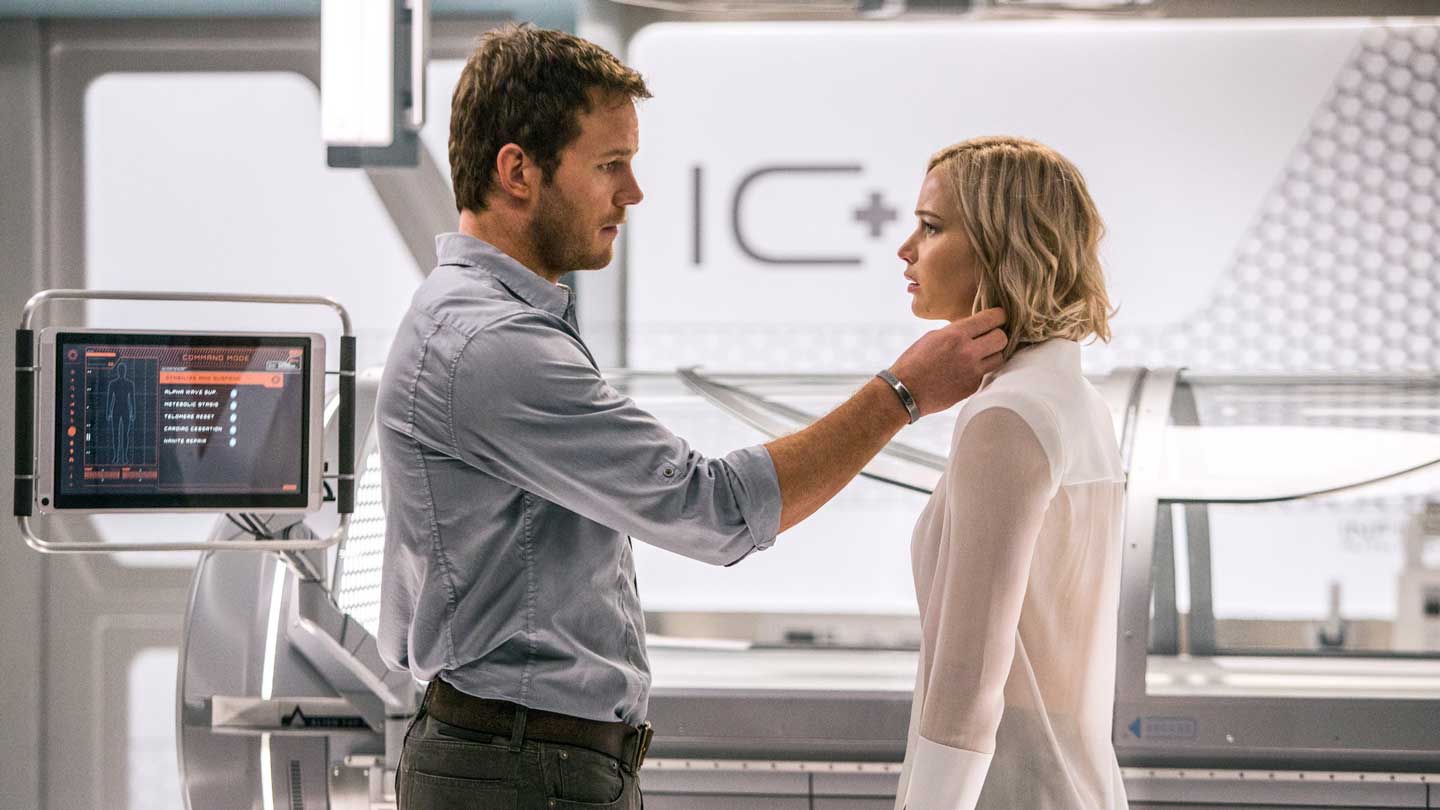
How much better would it have been if she woke up, spent a miserable year alone, and then woke up Chris Pratt? Would this make the feminists happy? Or would they decry the obvious sexism in the suggestion that a woman cannot live without a man? Maybe you just really can’t win, though I would have preferred this inverted version.
Well, the ethical wrong of robbing someone of the life they planned so they can keep you company instead is just as wrong when you flip the genders.
However, as we discuss in Part 2 of this article (coming soon!), sci-fi is always working on a metaphorical level too, and the metaphor here (or at least one interpretation) is that Aurora’s life is ruined by a guy who really wants her in a relationship and judges what SHE wants to be less important. In the real world, this happens much more often to women than to men.
This is not to say that a gender flip would be inherently bad – that could totally work. But it would change the symbolic meaning of the story somewhat.
Hey David,
I’m pretty sure feminists who watched the first two acts of this movie, including myself, ought to be fine with it. It’s about exploring a situation. The situation is bad, sure, but it honors the situation and what it refers to. I’d even describe this as a feminist movie – or at the very least, a feminist-leaning interpretation of the original script. For the first two acts. Certainly it should not be a problem in itself for the conflict in a story to involve people doing bad things.
It’s not the _presentation_ of the problem that’s the issue here, it’s the _resolution_ of it, which we’ll go into in part 2.
There have been pretty much zero calls to censor Passengers or boycott it or anything like that. The movie was panned so badly by critics that almost nobody cares about it. So starting from the assumption that the problem here is that “the feminists” are causing a ruckus is I think incorrect.
The problem here is that Sony dropped the ball on making this movie, regardless of who the audience was.
We’ll go more into this “what could they have done?” in part 2, so if that interests you, stay tuned! And thanks for reading!
-Pete
I thought that one worry expressed in your discussion was about how this movie has a man who selfishly made a decision for a non-consenting woman about how she will spend the rest of her life – and yet, the movie clearly treats us like we should think that he did something forgivable. This definitely pokes a raw wound when we think about gender relations, because in most of the world, men still feel like they have the right to decide the fates of women, and in our part of the world, that kind of thing was common all too recently as well.
I suggested reversing the genders so that this raw wound is not biasing our moral emotions toward the characters. I have a strong feeling that Jennifer Lawrence would as a matter of fact be much easier to forgive for exactly the same behavior – don’t you think? But it couldn’t be because the ethics of her act would be any different. The raw wound thing is a part of the story, but I worry also that it’s easier to not forgive a guy because we tacitly expect guys to act by principle, whereas women have more social leeway to overrule principles in the heat of concrete situations fought with emotion. If so, that’s a kind of sexism too, and it’s worth making explicit.
Part 2 is up! If there’s still good discussion fodder going maybe we’ll put together a follow-up Part 3!
“The movie was panned so badly by critics that almost nobody cares about it”
oh really, fuck critics……plenty of people love this movie
I haven’t seen this film, but I did read a version of the screenplay a ways back. As far as I can tell, a lot of things have been changed, so I might be coming at this from the wrong angle. (In the script I read, the third act had the ship ejecting most of the pods, including the one where Aurora was, so she would have died without Jim’s interventions. She takes a “you’re a jerk for that, but I’m not dead so I guess I’ll let it go” attitude IIRC). Since this is a work of fiction, we can assume everything in it was constructed. Someone decided to write up this scenario and come up with all these implausible reasons why Jim can’t wake up the crew/go back to sleep. Someone decided to write this movie instead of the actual romance version of this movie where Jim and Aurora both wake up by chance. The gender politics of this are a mess because someone wrote the movie this way.
But, taking the scenario at face-value for a minute… Jim is basically condemned to a life of complete isolation. How is he supposed to deal with this without waking someone? It’s not the right thing to do, but it seems like it’s what most people would end up doing. I’ve been surprised by how much people have indicted the very idea of him waking up someone.
All I can say is stay tuned for part 2!
“I’ve been surprised by how much people have indicted the very idea of him waking up someone.” Okay, let’s say someone has a terminal disease. The only way to survive this disease is by spreading it to someone else. Then you both have the disease and you have to live in the hospital for the rest of your life, but neither of you will actually die from it (probably). Is it okay to pick a random person and infect them with the disease?
I’m not saying it’s okay. Of course, it’s not okay for him to do that. But I do think it’s understable (again, in theory, I haven’t seen the movie), and I think it’s what many people would end up doing. The responses I’ve seen to the movie seem to downplay the emotional toll of that kind of isolation. People seem to believe they’re above doing something wrong for survival (which isn’t surprising, I suppose. We tend to assume the best of ourselves and the worst of others). It’s certainly not one to one, but there is so much talk about how abolishing solitary confinement as a punishment because of how wrong and damaging it is for prisoners. It’s easy to say “it’s wrong to wake someone else up.” And it is. But it would be much harder to actually be in that scenario and have to choose between the wrong thing and a life of total isolation every since day. I’m sure I could convince myself of that day one, day two, etc… but year two? Year three?
The movie Indecent Proposal would have been very different if the one indecently proposing had been Danny DeVito instead of Robert Redford. I mean if you get a kitchen pass to sleep with the Sundance Kid, getting a million dollars for it is just gravy.
Using the same logic, how different would this movie be if it starred Josh Gad instead of Chris Pratt?
Upfront, I am sorry @fenzel and @Matthew_Belinkie, because I am gonna hate on your ideas. I really hope this provokes discussion, because I do think that this film offers a complex view of morality. I also am 100% up for having my mind changed by reasoning and argument.
#1. First quibble – Waking someone up from cryo-sleep is not murder and it is not rape. Aurora is still 100% alive and has the opportunity to live a full life. She is in no imminent danger from Jim and is likely never to be. He does not sexually exploit her, injure her, or harm her, except in one crucial way. Waking her up from cryo-sleep forces her life down a course she did not choose. Now that she is on the ship and awake she has choices. She can read, she can party, she can drink, she can write, she can form a relationship with the other person who is awake, she can create art on the ship, she could make a replica of Devil’s Tower out of mashed potatoes. What she cannot do is live the life she planned as a reporter on a colony planet and return to life on Earth. Her plans were great and they were her own, but they were foiled. She has an object (Jim) she can blame for foiling her plans, and he does not, but otherwise they are in the same situation. The hate on this movie seems to discount how often actual human plans are foiled in real life, by people and not by people. Many people in America and around the world had their plans foiled by the 2008 recession. The blame is a complex web, but it all comes back to humans eventually, and most of us have accepted the judgment of the US Justice Department that prosecuting individuals will not fix or resolve the problem, and may even be impossible (given the constraints of legal prosecution in the real world). So I agree with everyone who says that she has the right to be upset with him. Whatever Aurora’s feelings are, they are justifiable. But he did not murder her.
#2. Quibble the second – Love is a complicated thing and it feels like a lot of the discourse around this movie discounts love. In my opinion, Jim loved Aurora before he woke her up. Love happens when people get to know each other. Think about the outpourings of love for celebrities who pass away. I am almost positive that most of those people did not know the person, but they loved them just the same. Jim got to know Aurora from her writing and her video logs. Absolutely he was physically attracted to her, but that is not all, and to say that he woke her up just to have sex with her is reductive. He was slow and patient and romantic with her. He respected her feelings, and waited to share the most despicable part of himself with her until he knew she loved him too (this bit was foiled by the robot, but that is neither here nor there). This is what people do who love each other. We don’t jump into conversations about all the ways that we have been abused, hurt, and the wrong we have done on a first date or first encounter. Would it have been more honest for him to tell her sooner, yes. Is that the way that normal people act, no. Also, to say that she could never love him, after he “violated” her is dismissive of the muddy waters that are consent. See the following: (note the article is not the same as the one the video references.)
https://youtu.be/I8XegAwuc-8?t=3m27s
http://jezebel.com/was-i-raped-1751678715
#3. Quibble the Third – This is probably what you keep referencing in your comments about sticking around for part 2, but I am gonna leave it here because I don’t want to wait. A solution that seems viable and is not as morally dark as him waking her up because he thinks he loves her and is gonna try and convince her, is to wake up 9 other people instead of just 1. Pick a diverse group of 4 other men and 5 other women and set about creating a small new civilization. He could tell them, “I couldn’t be alone and I needed people to be with, so I woke you up. You have lost the agency to live your lives on a colony but have the agency to live your lives on a ship and we can all be together and bond and build relationships and fall in love as we see fit.” Then Aurora is not obligated to love Jim, and the other nine might reject any overtures he gives to them. The others might band together in hating him, but being hated is more bearable than being alone. They could also choose to pair off and have children and build a real civilization on the ship.
My personal opinion is the last idea is not as metaphorically relevant with the Adam & Eve, Garden of Eden business, so I am happy with the way the movie is now.
You’re right that the analogous crime that Chris Pratt’s comitted is neither rape nor murder. It’s kidnapping and unlawful detention. What he’s done is rob her of the freedom to love her life as she so wishes. To choose, as much as one can, her own destiny.
First, I’d argue that her life in the ship could never be considered “full.” She’s being denied the ability to pursue her chosen vocation. He’s subjected her to a life of enforced sloth and leisure. Personally, it sounds like paradise to me, but I’ve come to understand that most people like having something to do with their time and lives. It’s also a situation where, due to automation and lack of people, it would hard to find anything particularly purposeful to do with your time. He’s forced her into a situation where one of the only purposes her life can ever have is to be his companion. That’s a pretty big, and quite selfish, curtailment of freedom.
And even if we say that having to spend her life with only the person who vastly affected it without consent isn’t isolation, it’s not far from it. People need communities, families, etc. 1 other person is nowhere near enough for most humans to not go crazy. Yes, there are plenty of inanimate forces that could lead to similar closing off of choice. But there’s a huge moral, emotional and legal difference between inanimate forces causing something and humans choosing to do something. If I were seeking a career in sports and a rock fell on me and crippled me, I’d be likely angry at the rock, fate, or maybe god. And maybe someday I’d accept it. But I wouldn’t be expected to “forgive” the rock, and accepting what happened would have nothing to do with the act of forgiveness. But if a human had pushed that rock, it would be a whole different story. That human would have chosen to push. And to make it more like the movie, that person would have chosen to push the rock *on me.* With the suspicion that is might me harm. And yes, maybe if there were extenuating circumstances, I’d someday forgive that person. But I think almost no one would fault me if i had a hard time reaching that mindset. The reason forgiveness is so powerful is because it’s hard. Part of the problem with this movie (from what I’m reading in this article and part II) is how we get to that moment of forgiveness.
The freedom to determine one’s own destiny, both in the large and small scale is a sacred to a whole lot of people, especially Americans. Lacking complete control over inanimate forces that one can call fate or luck, does not diminish that. Taking any amount of that from anyone is a serious matter. It’s why incarceration is a punishment above and beyond whatever the conditions of the prison are. It’s why there’s due process and habeas corpus, as a way to prevent that this curtailment of freedom, of choice, of control over one’s life isn’t abused.
By waking her up, he has robbed her of a considerable amount of freedom. She can’t go back to earth. She can’t decide to stay on the colony. She can’t decide to marry/date/have sex/ be friends/ with anyone else. She can’t try a new career, open a business, travel, love somewhere else, and on and on and on. She isn’t free. That’s the violation.
As for love, many, many kidnappings are done by people who profess to love their captives. And many captive grow to “love” their captors. That does not mean we, or the law, forgive that trespass against a person’s personal soveirgnty.
Finally, if the movie did make us want to forgive him, or even convince us to, but stayed clear about what, exactly we were forgiving, it would be a very interesting statement. It would be showing us what it’s like to be passively complicit in his crime.
Thanks so much @Dean Moriarty for the thoughtful reply. I appreciate it. I have read and thought more about the situation presented in the movie since I posted previously. I was being strongly reactionary in a way that was probably unfair. Thank you for clarifying the argument.
I can totally get behind an indictment of his actions on the basis of kidnapping and false imprisonment. You make very cogent arguments in that regard. The thoughts that ran through my mind as I considered that were regarding Elizabeth Smart. I lived in Utah for a while and that case was a big deal to a lot of people there. And I know she is at peace with what happened and has offered words of forgiveness to her captor, but I, nor any sane person, would expect her to fall in love with the man. That is not a rational choice. From that perspective I could see the incredulity at the love story bit that has been evident in the criticism of Passengers.
The two analogies that come to my mind based on the premise of false imprisonment is when innocent people are kept in prison until their convictions are overturned on new evidence and a kind of alternative slavery.
In the case of people who are innocent but spend many years in prison, what happens? I am not an expert and so I am sincerely asking anyone who knows. Does the state have to compensate for lost wages, time, etc? Is their freedom considered sufficient compensation? If all they get is their freedom, is that morally right, or does the system owe them compensation for their loss?
The alternative slavery is illustrated by you above. A principle dynamic of 19th century American slavery was that one of its primary concerns was labor. In Passengers, she is a slave but has no labor, and is in fact almost incapable of performing labor because of the automation. So really the reason he wants her there (removing the love equation) is as a companion. Basically she is like the mother tucking him in who cannot leave until he falls to sleep. From that angle, waking her up is super patronizing. “I just needed someone to be with –pouty face :( –.”
Two questions that have still not been addressed in all of this discussion, and I welcome any comments that would address them (and any comment for that matter). Would we feel differently if he had of woken up 5, 10, 20, or more people to actually form a society on the ship? And, if he had of been upfront about being lonely and choosing to wake her up right after he did it (instead of trying to get her to fall in love with him under false pretenses), would it make the movie better or worse?
Thank you for your thoughtful reply.
I was actually thinking of both of the same scenarios you talked about when I was writing out my comment. Unfortunately, I was writing on my phone which made typing hard, and I’m sure you noticed all the typos, and I was trying to be succinct.
Before I go on let me answer one your questions as far as my understanding of it. Though I’m no expert or anything, I believe I’ve read about cases where people who are imprisoned and are proved innocent are indemnified monetarily after they are released. Obviously the money is probably not enough to make up for loss of liberty for all those years, but I believe the idea is that it is more an admission of wrong doing by the system, or the system’s functionaries, than an attempt to “make up for it.”
Of course, neither of the scenarios that you mentioned, which I also think are great scenarios to bring up, fit perfectly as an analogy onto the plot of the movie.
In the first scenario, the biggest, most important difference is that in the movie it’s a one time action. One momentary lapse of moral restraint. In the Elizabeth Smart case, and in so many cases like it (and it turns my stomach that it’s common enough that we can speak about it like this) the captor has to make the repeated and ongoing decision to deprive someone of their freedom.
In the scenario of someone wrongly convicted, it is the system that is most often seen to be at fault. It is a failure of the safeguards against bias, error, caution etc. Compared to the movie it’s more like blaming the ship’s builders/crew/ designers for not putting safeguards in how and who can wake whom up. (like maybe only crew and vital personnel don’t need a code to be awoken). It might be closer to a scenario where someone testifies that an innocent person was the perpetrator of a crime in order to escape imprisonment themselves. Of course in that scenario the person would avoid jail (Chris Pratt’s ‘imprisonment’ is not ended when he wakes her up, just his isolation) and could recant their statement. In this movie the decision to wake someone up is irrevocable (until the plot intervenes, of course).
One real world scenario that we haven’t brought up that might give us something to think about is the case of a person in prison “giving up names.” This scenario also speaks to Crystal’s point above about his isolation.
In Latin America in the 70’s military dictatorships routinely kidnapped, imprisoned, and tortured people who had leftist, or even unorthodox, philosophical or political views. They would extract from them, usually through torture, but also isolation, false confessions of being guerrilla members. They’d also get names of ‘accomplices’ from them. Obviously, most of the times the names where any and every name that would make the pain stop.
These people who gave names inflicted onto the people who they “gave up” the same torture and loss of freedom that was being forced on them. But, I think, most people would not blame them for it, because they were being tortured.
The question for this movie, then, is was the isolation imposed on Chris Pratt painful enough that it can make his choice to impose a very similar kind of pain onto another person more forgivable?
I don’t have an answer for that. I really don’t. Obviously, I don’t think his situation (from the description of the plot above) reaches the level of torture, and I’m not trying to belittle or trivialize the situation of victims of political imprisonment and torture. Does that make it less forgivable? Does it make it more, because the pain passed on is less?
And the more I write about this, the more it seems like this movie missed a huge opportunity to wrestle with some really complicated and thorny moral questions. Which is a damn shame.
As to your other two questions, I’ll answer, for my part the second one first: Yes, I think we’d feel differently about him if he’d told her immediately. In a situation where one is asking forgiveness, which he is even if he never says it, it’s important to be able to trusts that the person’s apology is genuine. Without the trust, which he violated not only by lying, but by creating a life, which, again, was her only possible life at this point, based on a lie he makes it hard for her to trust him about anything. I think without that trust, whatever peace she may be able to achieve with him would always be on a shaky foundation.
If he woke more people up? I think then we’d be in an entirely different set of issues about group dynamics, leadership, responsibility to various causes, etc. It could be very interesting, but it doesn’t sound like what this script wanted to explore, regardless of the efficacy of that exploration.
I haven’t seen the movie (yet), but it reminds me a lot of “The Quiet Earth” (1985, New Zealand). Anyone else pick that up?
2 people were needed to safe they ship, had jim not woken aurora up, 5258 humans would have been dead
I see it as relating more to humans, AI…replacing GOD?..wave if the future:( and Robotics replacing humans…our religion is now in ALPHABET and not our Creator. This is a Seminole view for the new way of the world:( They take their first breaths and wake amongst an artificial situation AI and having been depopulated (think Gates) and Adgenda 21, etc are getting their new chance at life with no hunger, no population issues etc. Look up Google and their GOD, AI brain. You’ll asked for it with Elexa, DOT, Echo, etc listening and learning. Massive data thru Amazon, Facebook, Google, etc etc. Think and buy local from small businesses and live an authentic life without BIG Global.
What a fucking shit show this article is. Damn it if I were stranded on a ship like that I’d do the same damn thing and so would you. And you better well know it. Maybe in your mind he only woke her up for sex… but I tell you I KNOW I would go nuts without human contact. And hey, might as well be good for sexual companionship too. You didn’t overthink it at all… Doesn’t even seem like you thought about it, you just blurted all of your liberal bullshit all over it. Awesome.